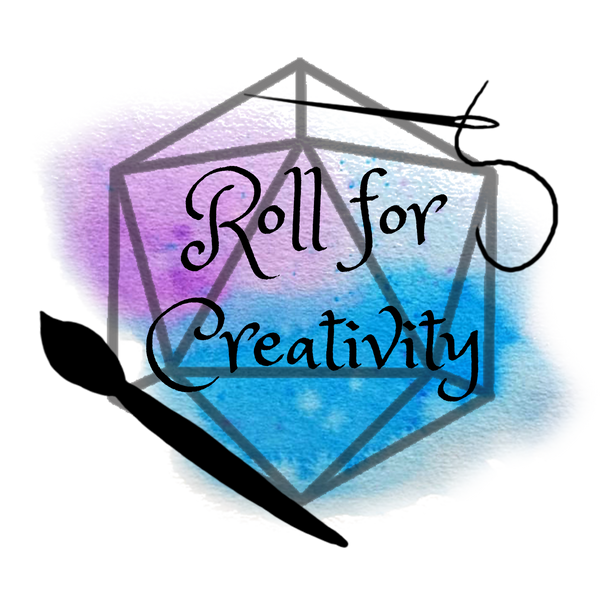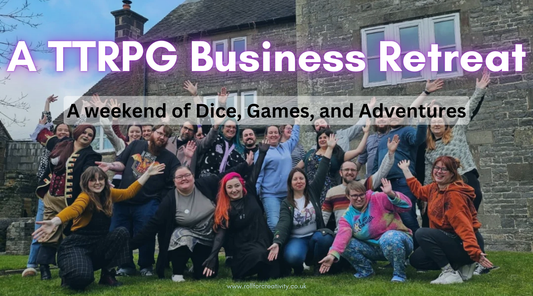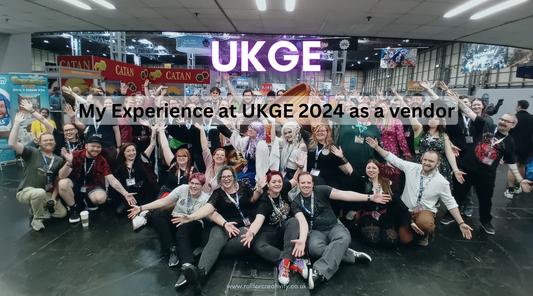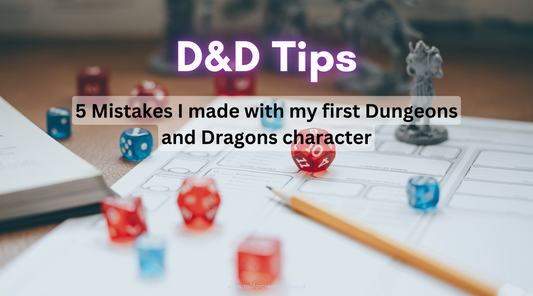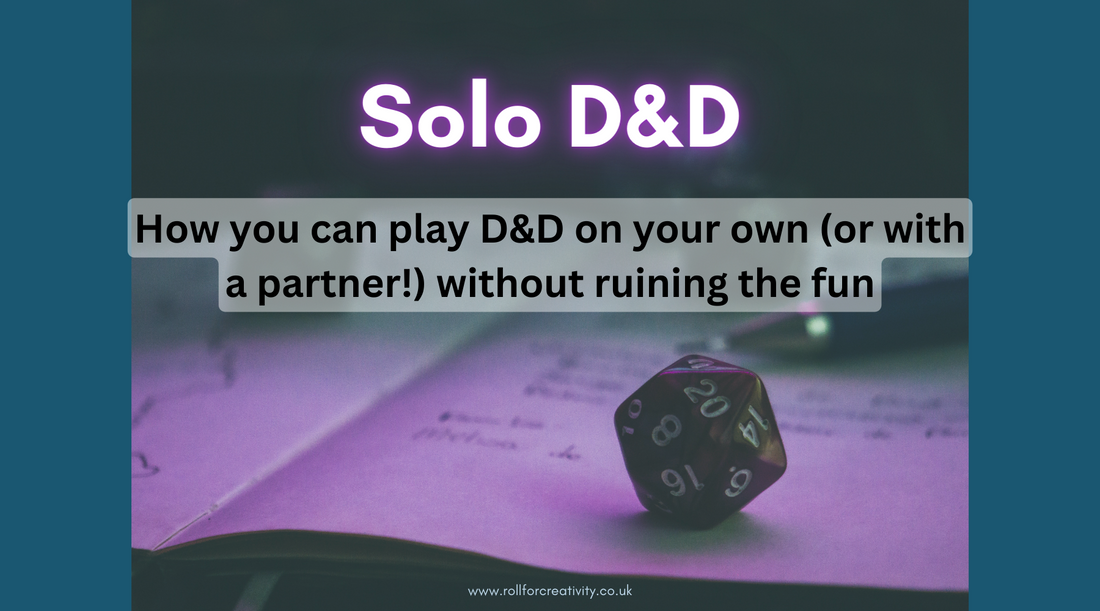
Can you play Dungeons and Dragons on your own?
D&D is a tabletop role-playing game (RPG) that involves creating characters, exploring imaginary worlds, and collaboratively telling a story. While it is typically played with a group of people, it is possible to adapt it to solo play. My partner and I even use this to run a 2-player game for date night!
The Solo Adventurer's Toolbox
There are a few resources out there to help you convert the game into a solo adventure, but I personally use The Solo Adventurer's Toolbox by 5E Solo Gamebooks and available on the Dungeon Masters Guild.
The Solo Adventurer's Toolbox Part Two: The Toolbox Expanded
Bundle (Toolbox + Toolbox Part Two)
We personally bought both toolboxes as a bundle, but you can get away with just the first toolbox. 5E Solo Gamebooks also have a lot of solo adventures available to purchase separately.
How to play Solo D&D
When you first open the above toolboxes, it can be a little daunting. You are presented with lots of tables! Setting up a location and basic adventure line can be a bit slow, but once you get the hang of it things become easy.
For those that prefer to see things in action or in a video format, GinnyDi's video on this is entertaining and helps you get the gist of how to play this solo version. Again, my partner and I use this system to run date night games for the two of us, so neither of us is the DM.
1. Choose your character!
You can't roleplay without a character, so let's make one. The author suggested running solo adventures with two characters so you have a bit of interaction and they can play off of each other. Solo adventures are the perfect opportunity to play out an existing character's backstory, to help you understand them a bit more. Or perhaps you want to try out a certain build or feat? Now's your chance!
2. Decide on your story.
If, as above, you're playing out a character's backstory, the likelihood is you know exactly how you want this adventure to play out. Even if you don't know the details, you might have an idea of the type of story you'd like to play.
If you have no idea, don't worry - that's what all the tables in the toolbox are for! Simply leave your journey up to the dice.
If you later decide you want the adventure to head in a certain direction, you can make that happen. It's your game; play it how you want! To quote Pirates of the Caribbean, "the rules are more like guidelines". The "rules" and tools are there to help you play, but you can play things how you want.
3. The mechanics
The main mechanics (combat, skill checks etc) of the game are the typical D&D method. The main difference is you don't have a DM to help guide you through or answer questions. The Toolbox provides you with a few tools to help you out with this; the Oracle, the six D12 method and random tables.
The Oracle is a question-answer mechanic. The questions you'd usually ask of your DM, such as "Is the door locked?", "Can I see any guards?" or "Is anyone acting suspiciously?", you ask the Oracle instead. The result of your roll will give you the answer. There are even has modifiers if you think a yes or no is particularly likely or unlikely.
Six D12s is introduced in the second Toolbox book and is optional but very useful to quickly set up or add detail to a map area. Simply pick your six D12s (different colours or designs helps here!) and assign each one to a different factor. The factors are Monsters, Clues, Environmental Features, NPCs, Treasure and Events. The table provides you with trigger values, which are like modifiers based on how likely it is for each factor to appear in each area. Your rolls will then direct you to other tables to determine what's in there.
Random tables make up the bulk of the books. Need to flesh out a room with features? There's a table for that. Need a quick NPC, they got that covered. If you find yourself approaching a settlement, there are tables to determine the size, what merchants there are, what's going on there, and even the weather. You'll be using these tables a lot to replace the planning a DM would usually do for you. Think of it as world building on the go.
Our favourite random table so far has been the keywords table. This is how we've built the bulk of our storylines and mission objectives, and it can be scary how well the keywords fit sometimes!
That's the basic idea of how the game works. In GinnyDi's video s,he shows an example of her solo play. Below I've included the adventure my partner and I had using this solo system.
An example "solo" adventure
I was playing with my partner so we each had a character. We decided to start off in a tavern for simplicity's sake. We rolled up our starting town and the tavern on the random tables.
My character, Safora, was of noble birth and wasn't meant to be seen in such lowly places. My partner's character Yarou had gotten into a bit of debt with his gambling problem. In exchange for keeping Safora's secret and allowing Yarou to pay off his debt, the tavern owner requested us to do something for him.
After rolling on the random magic item table and getting the result of Charlaton's Die; basically a magical loaded die. (I told you it was weird how well the keyword fit sometimes!) We also rolled a random NPC up to see who could tell us more about this die. From that information, we then decided that the tavern owner wanted us to claim this magical item for him, and last he heard it was in the possession of a miller in a nearby town.
And so, Safora and Yarou set off on their adventure. As a noble-born half-elf sorcerer, Safora didn't think much of the wolf-ish Barbarian she was travelling with. The interaction between our two characters (and Safora's gradual acceptance of and friendship with Yarou) meant we still had the roleplay elements that are typical of a D&D game.
We did roll some tables for encounters while travelling but didn't have any interesting encounters come up. We did however come across a strange statue, but neither of us could work out the puzzle on it. We'll have to travel back to it again!
When we got to the next town (again, rolled up on the random tables), we went to a tavern (the Greasy Buttock) and started asking about the miller we were looking for. Our keywords had been "flood", "amnesty", and "a new building being opened". We interpreted this as our miller (named Conbin Hogcheeks) has a sudden influx of gold (likely due to the loaded die) and opened his own mill.
After a bit more asking around, (and rolling on the keywords table) we had the words "restrain" and "unveil". We interpreted this as Conbin had been kidnapped after someone discovered he'd been cheating when gambling. So off to the mill we went for clues!
At the mill, we discovered signs of a struggle, some blood, and a cultist symbol. Using the symbol we were able to deduce he'd likely been taken to a nearby cultist's cave.
When we got to the cave, we used the dungeon random tables to generate each room one at a time, as well as whether each room had any monsters, treasure, secret doors etc. The first room we entered had 3 guard dogs, which were quickly dispatched. Continuing on into the caves, we came upon a room with 3 men, and a bloodied, unconscious Conbin.
After a bit of a struggle with the cultists (and Yarou falling down the stairs after failing to sneak in), we were able to beat the cultists and rescue Conbin! Rolling on the random treasure table, we also got a fair amount of gold!
Conbin was taken back to the town for medical attention. After a few persuasion rolls from Safora, he decided that the die was too much trouble, and handed it over to our adventurers.
Conclusion
While it can be a bit confusing to begin with, this system worked great for us. We printed off the key tables we used a lot (the Oracle and the Index of tables were our most used) and had the PDF open on a laptop. We used A3 paper to draw up the dungeon as we were discovering it, and used simple circular cardboard tokens. The system was very fun for a spontaneous story that revealed itself as we played, with neither of us knowing what would happen next!
I think the solo system is a great idea. If you wanted to play out a character's backstory or a past event you may have heard about while playing a campaign, this works great! Or it's also just a fun way to have some D&D fun, without scheduling being an issue!
What do you think? Would you play this solo?
